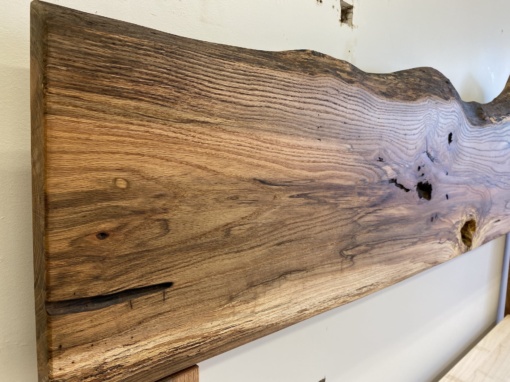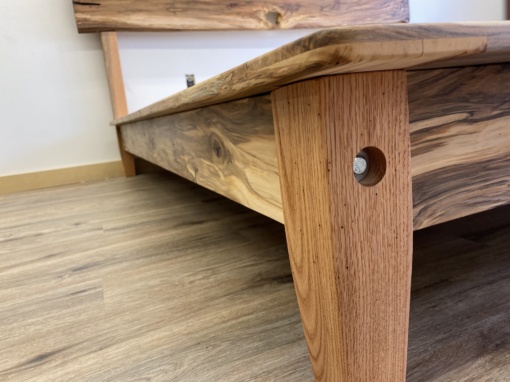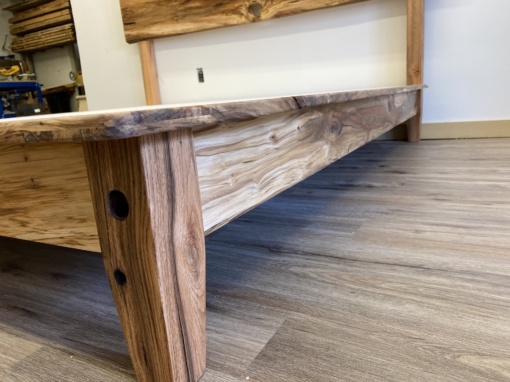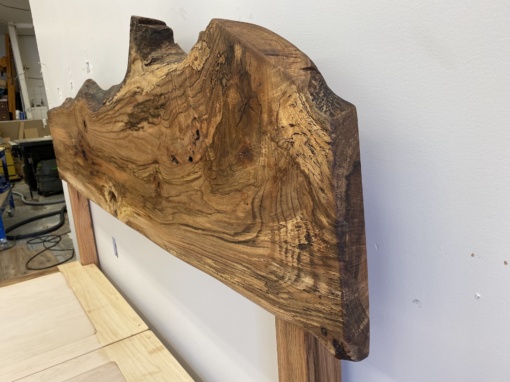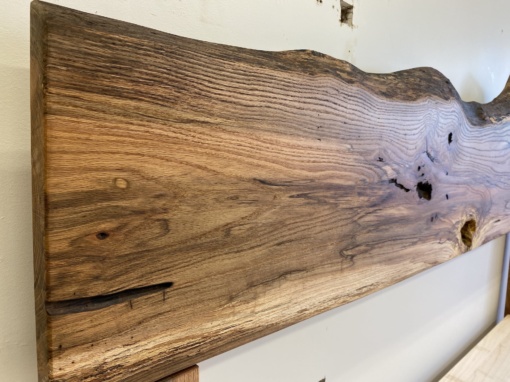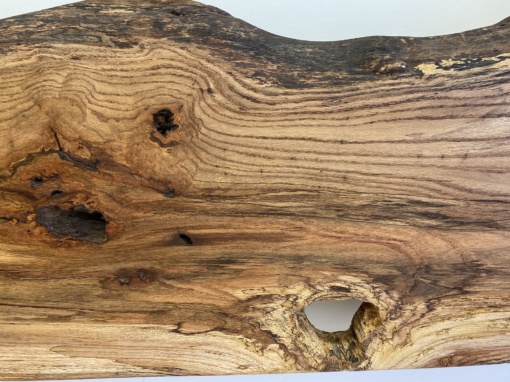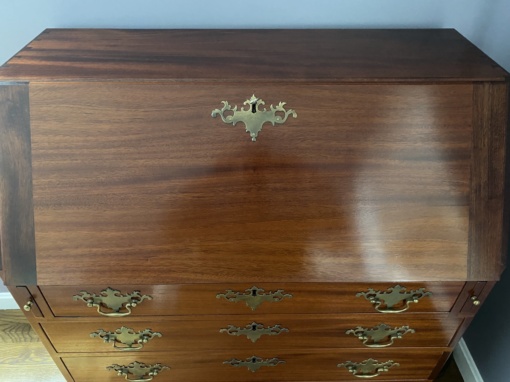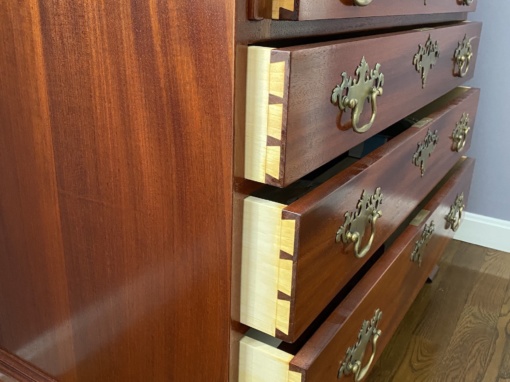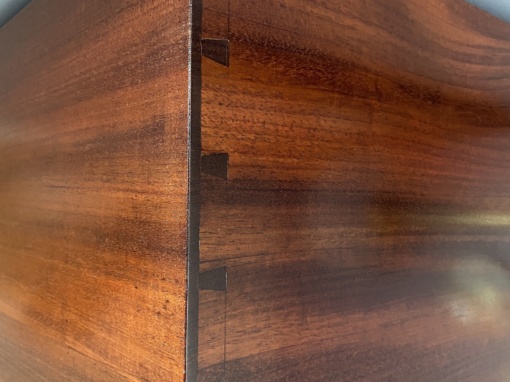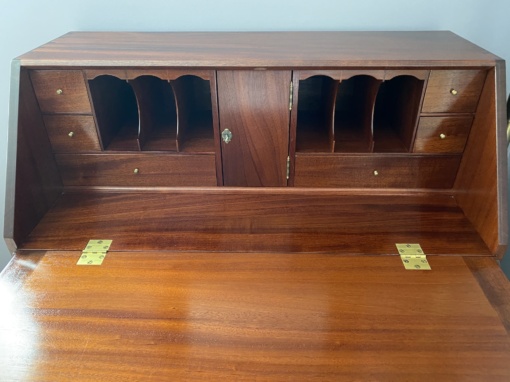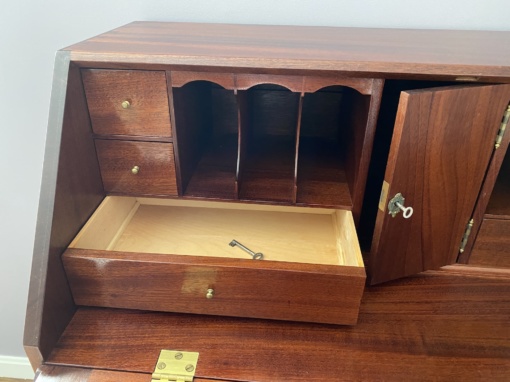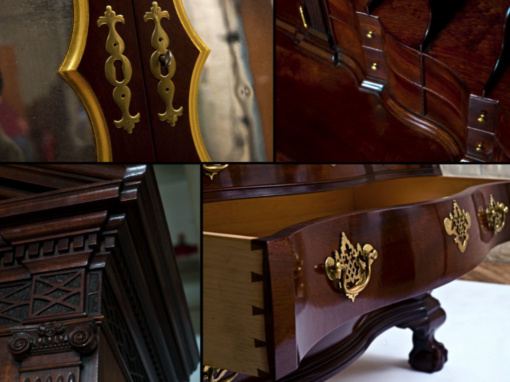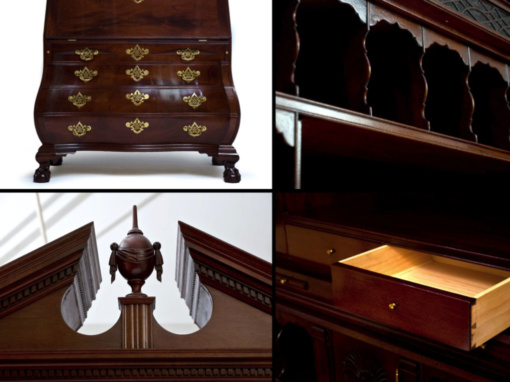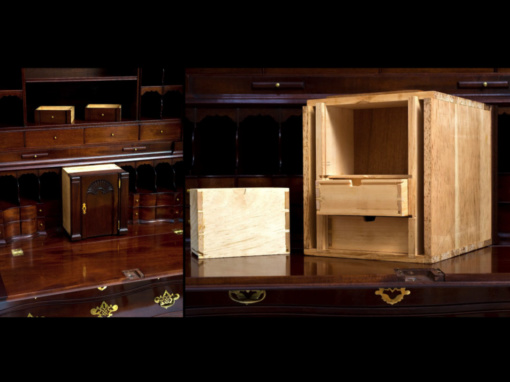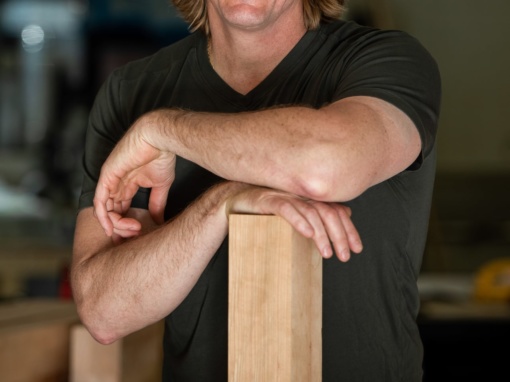 Concrete countertops can be tinted in a wide range of colors, and can be cast with integral sinks. Image courtesy of Soupcan, Inc.  Engineered stone counters mimic the look of natural stone. This counter, manufactured by Silestone, is a mix of quartz and resins. A wide variety of colors, including many not found in natural stone, are available.  Stainless steel counters provide a rugged and dent resistant finish that will last a lifetime. Image courtesy of CJ Design Kitchen Countertops  Stone counters, like these granite counters, are durable. Cared for properly, they will last a lifetime.  Solid surface counters, like this Corian countertop, can be formed with seamless sinks and backsplashes. Additionally, the edges can be milled and formed into unique profiles.  Laminate counters are available in the widest range of colors. Quality laminates, like this Wilsonart laminate counter, resist scratches and dents. |
Countertops have come a long way since the days when laminate was king. By combining form with function, they set a tone and a standard. Be it the classic elegance of granite or wood, a colorful solid surface or laminate, or the sleek feel of stainless steel, countertop options abound.
Countertops 101
Dealers price counter surfaces by lineal or square foot, with template, delivery, and installation (TDI) quoted in the total price of the countertop. Prices vary depending on texture, color, pattern, intricacy of edging, number of holes, sink type, and seams. Seams affect look and durability, and can lead to water seepage that warps wood and causes laminate to pull away from its substrate. A qualified, certified kitchen designer can help research qualified manufacturers and fabricators.
Heavy countertops, like cement, natural, and engineered stones, are held in place with gravity and fixative, while other counters are screwed and glued. Prices range from $16 per lineal foot for some laminates, to $100 per square foot or more for specialty stones. Since countertop pricing ranges from the economical to the astronomical, it’s important to consider longevity, durability, maintenance, and price installed.
Concrete
Concrete is one of the more dynamic products to grace the kitchen. It boasts texture and detailing unlike any solid product. It is porous in nature, absorbs stains easily, and must be sealed regularly. At an inch-and-a-half thick, concrete weighs the same as a granite countertop. But, since concrete must be poured and cured prior to installation, it’s important to get it right. "The type of concrete used for countertops is highly engineered. Every fabricator has a different formula," says Gerry Santora, President of Soupcan, Inc., a counter manufacturer in Chicago. The countertop fabricator should first template then create the countertop from a pre-cast mold in a controlled factory setting. On-site casting might result in a one-piece installation, but will require major demolition should the countertop need to be removed. Concrete runs about $100 per square foot installed. More About: Concrete Countertops
Engineered Stone
Engineered stone is a quartz-composite product mixed with colored pebbles, polymers, and epoxy. It has an even pattern and more color options than natural stone. So, if a kitchen calls for more counter space, it’s easy to order the same pattern and shade. Engineered stone is an extremely durable product that takes the heat and resists stains. Engineered stone is one-and-a-quarter inches thick, and is installed using epoxy. At $50 to $100 per square foot, engineered stone is as costly as granite. More About: Quartz Countertops
Stainless Steel
Stainless steel is chic, contemporary, and noted for its association with professional kitchens. It is stain resistant, and the only surface that can be safely bleached. Newer applications include brushed or textured finishes that help camouflage scratches. Welded stainless-steel sinks create an integrated look, while backsplashes with corrugated patterns create dimension. Stainless steel, when attached to a wood substrate, becomes more sound resistant. Regular rolled edges, bullnose, or Marine edges (no drip), are standard. Stainless steel runs anywhere from $100 to $200 per square foot. More About: Stainless Steel Countertops
Stone
Natural stone needs to be seamed, is typically sealed to protect it from damage and stains, and sells for anywhere from $50 to $100 per square foot installed. Granite is quarried worldwide, with colors and patterns that reveal the region and the geological conditions that created it. "These are wild creations of nature," says Stephanie Witt, former president of the National Kitchen and Bath Association. With granite, each slab is unique, with random and inconsistent patterns. Buyers may visit the fabricator to select their own slabs. Granite is graded for a host of variables including density, strength, water absorption, and acid resistance. Granite tiles are less costly but have more seams, while a 3/4-inch granite sheet can also be purchased and applied to a wood substrate for the same look at less cost and weight.
Marble is less stain-resistant and more porous than granite, so it may be damaged by acidic foods. New England slate, from New York, Vermont, and Maine, is durable, non-porous, and requires no sealing. Certified kitchen designer Diane Tardif, owner of Woodstock Kitchens and Baths in Vermont, favors slate for breakfast bars and counters. "The beauty of slate is that it comes to room temperature," she says. Natural stone runs from $50 to $100 per square foot, with black slate, followed by red slate as the most expensive. More About: Stone Countertops
Wood
Wood has a warm and luminous appeal for countertops and kitchens. Oak, maple, cherry, red beech, walnut, teak, and mahogany are all hardwoods favored for countertop applications. Some exported wooden countertops are built with finger-jointed construction and installed with miter-bolted seams for added durability. Wood is one of the more sanitary products for the kitchen, with inherent properties in to protect it from bacteria build-up. Maintenance is required, however, starting with regular mineral oil treatments, particularly near the sink, and extra caution with extremely hot cookware. Prices for wood countertops range from $50 to $100 per square foot installed. More About: Wood Countertops
Solid Surfacing
Solid surface countertops offer seamless acrylic faces with seams that are only visible from the underside. With solid surfacing, sink and counter materials can be integrated to create a fluid, graceful line. Solid surfaces come in a rainbow of colors, patterns, and styles, including stone and glass look-alikes. They are stain and heat resistant, with more edging and border options than natural stone. Scratches are easily softened with a non-abrasive scrubbing pad. More About: Solid-Surface Countertops
Laminate
Laminate countertops are economical and come in a host of colors and patterns, but they are not built to last. Laminate is not scratch or heat resistant, but it is stain resistant. For a nominal cost, manufacturers such as Wilsonart and Nevamar will upgrade a surface to extend the life of the laminate. Laminate is glued onto an inch-and-a-half particleboard base and can be constructed using a home store’s standard blank. Fancy edges like bevels and curves must be custom ordered, however. For cosmetic revamps, sheets of laminate can be glued to the existing particleboard substrate. With Counter-seal, under-mount sinks are also an option with laminate countertops. More About: Laminate Countertops
Ceramic Tile
Ceramic tile remains a popular and economical option. It is scratch and heat resistant, but high maintenance, since the grout needs to be sealed regularly for optimal stain protection. Ceramic tile runs from $11 to $30 per square foot. Keep in mind that undertaking a laminate or tile installation can be a nightmare, so its best to do the homework first. More About: Ceramic Tile Countertops
More Countertop Resources:
- Inspirational Countertop Gallery
- Cleaning and Maintaining Stone Countertops
- Install Ceramic Tile Behind a Countertop
- Countertop Trends
Credit: Renovate Your World


